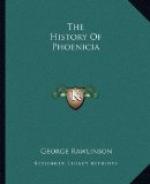[Footnote 0117: Gen. xiv. 18-22.]
[Footnote 0118: Philo Bybl. Fr. 1, Sec. 5.]
[Footnote 0119: Records of the Past, iv. 109, 113.]
[Footnote 1110: Gen. vi. 5.]
[Footnote 1111: Ps. cxxxix. 2.]
[Footnote 1112: Max Mueller, Chips from a German Workshop, i. 28.]
[Footnote 1113: Philo Bybl. Fr. 1, Sec. 5. Compare the Corpus Ins. Semit. vol. i. p. 29.]
[Footnote 1114: See Renan, Mission de Phenicie, pl. xxxii.; Gesenius, Linguae Scripturaeque Phoeniciae Monumenta, Tab. xxi.]
[Footnote 1115: 2 Kings xxiii. 5. Compare verse 11.]
[Footnote 1116: Gesenius, Monumenta Phoenicia, p. 96.]
[Footnote 1117: Ibid. pp. 276-278.]
[Footnote 1118: See Doellinger’s Judenthum und Heidenthum, i. 425; E. T.]
[Footnote 1119: Doellinger, Judenthum und Heidenthum, i. 425, E. T. Compare Gesenius, Mon. Phoen. Tab. xxiii.]
[Footnote 1120: Herod. ii. 44; Perrot et Chipiez, Hist. de l’Art, iii. 77.]
[Footnote 1121: Judg. ii. 11; iii. 7; x. 6, &c.]
[Footnote 1122: 2 Kings i. 2.]
[Footnote 1123: Strab. iii. 5, Sec. 5.]
[Footnote 1124: Perrot et Chipiez, Hist. de l’Art, iv. 113.]
[Footnote 1125: 2 Kings iii. 2.]
[Footnote 1126: See the representation in Perrot et Chipiez, Hist. de l’Art, iii. 73.]
[Footnote 1127: Doellinger, Judenthum und Heidenthum, i. 427.]
[Footnote 1128: Perrot et Chipiez, iii. 77.]
[Footnote 1129: Gen. xiv. 5.]
[Footnote 1130: Perrot et Chipiez, iii. 419, 450, 555, &c.]
[Footnote 1131: Ibid. p. 554.]
[Footnote 1132: Curtius, in the Archaeologische Zeitung for 1869, p. 63.]
[Footnote 1133: Kenrick, Phoenicia, p. 303.]
[Footnote 1134: Menand. Ephes. Fr. 1.]
[Footnote 1135: See Philo Bybl. Fe. ii. 8, Sec. 14; {’Ilon ton kai Kronon}. Damascius ap. Phot. Bibl. p. 1050.]
[Footnote 1136: Philo. Bybl. Fr. ii. 8, Sec. 17.]
[Footnote 1137: Diod. Sic. xx. 14.]
[Footnote 1138: Philo Bybl. Fr. ii. 8, Sec. 25.]
[Footnote 1139: Ibid. Fr. iv.]
[Footnote 1140: Ibid. Fr. ii. 8, Sec. 14-19.]
[Footnote 1141: Karth or Kartha, is probably the root of Carthage, Carthagena, Carteia, &c., as Kiriath is of Kiriathaim, Kiriath-arba, Kiriath-arim, &c.]
[Footnote 1142: Melicertes is the son of Demaroues and the grandson of Uranus; Baal-samin is a god who stands alone, “without father, without mother, without descent.”]
[Footnote 1143: See Perrot et Chipiez, Hist. de l’Art, iii. 567, 577, 578; Gesenius, Mon. Phoen. Tab. xxxvii. I.]
[Footnote 1144: Herod. ii. 44.]




